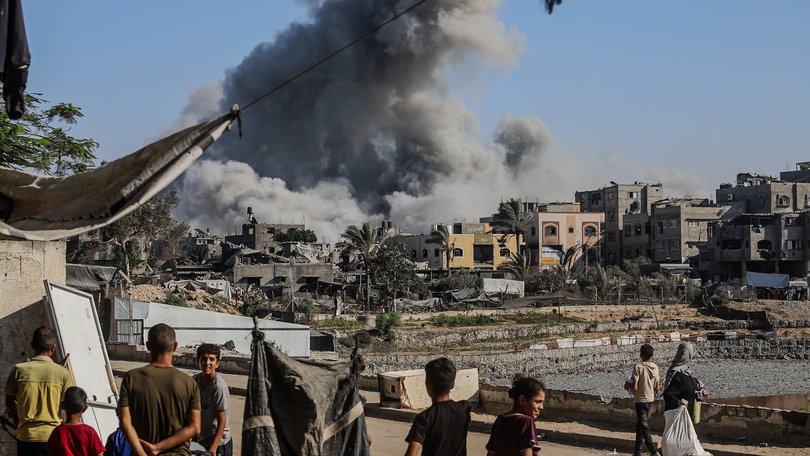With moves on West Bank and Gaza City, Israel defies global outcry
The developments raised questions about whether a new ceasefire proposal for the war in Gaza could move forward.

Israel on Wednesday approved new settlements in the West Bank and announced that it was moving ahead with plans to take over Gaza City, bucking international criticism and defying growing support for the creation of an independent Palestinian state.
The moves raised questions about whether a new ceasefire proposal, which officials have said is similar to terms that Israel previously endorsed, could move forward.
Experts said the two moves suggested that Prime Minister Benjamin Netanyahu was bending to the ideologies of extremists in his coalition in order to remain in power — even at the cost of isolating Israel internationally.
Sign up to The Nightly's newsletters.
Get the first look at the digital newspaper, curated daily stories and breaking headlines delivered to your inbox.
By continuing you agree to our Terms and Privacy Policy.The idea of a Palestinian state “is being erased from the table,” Bezalel Smotrich, the hard-line finance minister, declared after the government approved a settlement project of 3,400 housing units in the heart of the occupied West Bank.
“Every town, every neighbourhood, every housing unit is another nail in the coffin of this dangerous idea,” Mr Smotrich said Wednesday.
At the same time, the Israeli military said it was advancing plans to take over Gaza City, with troops already on the city’s outskirts and tents being moved into the southern Gaza Strip for displaced people.
An additional 50,000 reservists would be told to report for duty in September, while troops have already obtained “operational control” over 75 per cent of the Gaza Strip, the military said in statements. The United Nations has put that number closer to 90 per cent.
The military “has begun the next phase of the war,” said Brigadier General Effie Defrin, the Israeli military’s chief spokesperson.
The looming assault aims to prevent Hamas — which led the deadly October 7, 2023, onslaught on southern Israel that started the war — from regrouping and planning future attacks, an Israeli military official, who requested anonymity in line with military protocol, told journalists at a briefing Wednesday.
About 1,200 people were killed and around 250 others kidnapped during the 2023 assault. After nearly two years of Israel’s retaliatory war against Hamas, the Gaza Strip has been largely levelled and parts of it have been brought to the brink of famine. More than 60,000 Palestinians have been killed, according to the Gaza Health Ministry, which does not distinguish between combatants and civilians.
For Mr Netanyahu, “it doesn’t matter if these steps — the war in Gaza and the quasi-annexation in the West Bank — would damage Israel’s relations with the Arab world,” said Michael Milshtein, an Israeli analyst and former military intelligence officer.
He said both developments also showed that Mr Netanyahu believes he can continue to depend on American support, even as Arab and European nations sharply condemn Israel’s actions.
World leaders quickly condemned the announcements on Gaza City.
“The military offensive in Gaza that Israel is preparing can only lead to disaster for both peoples and risks plunging the entire region into a cycle of permanent war,” President Emmanuel Macron of France said on social media.
France is among a growing number of countries that, frustrated with Israel’s war in Gaza, have declared in recent months that they will recognize a Palestinian state at the annual UN General Assembly in September. While the United States has for years endorsed a so-called two-state solution, it has blocked recent efforts to recognize full Palestinian statehood under current conditions.
Prospects for a functional Palestinian state have been dim for years, and its boundaries have never been clear.
Mr Netanyahu has not publicly shared his position on the new ceasefire proposal, which Hamas has accepted and was announced this week by Qatari and Egyptian mediators. But a statement that his office released Wednesday night seemed to signal that the military operation was soon to begin.
Mr Smotrich has led a pressure campaign by hard-liners who have threatened to quit Netanyahu’s coalition, and potentially bring down his government, if the proposed ceasefire deal was pursued.
The new proposal has been described as a “partial deal” that would not immediately release all hostages and would postpone discussions about ending the war, including the issue of disarming Hamas.
As many as 20 hostages are still believed to be alive, according to Israeli authorities. The bodies of 30 others, they say, are being held in Gaza. Many Israelis fear that Hamas will kill the remaining hostages if the military operation goes forward.
The Israeli official who briefed journalists Wednesday described the military operation as “gradual, precise and targeted,” saying it would extend into areas of Gaza City where Israeli soldiers had not previously been during the war.
The city and its surrounding neighbourhoods remain a stronghold for Hamas fighters and the militants’ government, the official said.
Two other Israeli military officials said the operation would unfold in parts.
First, troops would encircle Gaza City while allowing the population to move south, passing through checkpoints to prevent Palestinian militants from escaping. Then, the troops would move in with force. The officials spoke on the condition of anonymity to discuss operational details.
Ahmed Saleh, 45, said Israeli troops were sending remote-controlled vehicles packed with explosives to blow up buildings, block by block, in the Zeitoun neighbourhood near where he lives in Gaza City.
“I hear the big explosions all the time; they are getting closer,” said Saleh, adding that he would try to stay in his home for as long as possible. If he is forced to leave, Mr Saleh said, he would head west to a beachfront, where he previously lived in a tent while waiting for the violence to ebb.
As the international community has focused on the devastating war in Gaza, the Israeli government has barrelled ahead with settlement construction in the West Bank.
The project that was given final approval Wednesday, known as East One, or E1, was delayed for more than two decades. While the United States had pressured Israel to reject settlement expansion, the Trump administration has been far less critical of settlements than most of the international community, which generally considers them to be illegal and obstacles to Israeli-Palestinian peace.
About 500,000 Israeli settlers and about 3 million Palestinians live in the West Bank.
Israeli authorities have advanced plans for more than 20,000 housing units as of late July, already the highest tally in years, according to Peace Now, an Israeli settlement watchdog. That has been accompanied by a campaign of brazen attacks by Jewish extremists on Palestinian communities.
On Wednesday, Jordanian Foreign Minister Ayman Safadi cited a “completely inhumane reality that the Israeli aggression has created in Gaza.” He also accused Israel of taking “illegal measures that continue to undermine the two-state solution and kill all prospects for peace in the region.”
The Israeli military official said the new operation will also expand humanitarian aid in southern Gaza, where displaced people are being told to move.
That will include opening new aid distribution sites, ensuring there is no fighting near them and opening new routes for trucks to safely bring in more supplies.
This article originally appeared in The New York Times.
© 2025 The New York Times Company
Originally published on The New York Times
